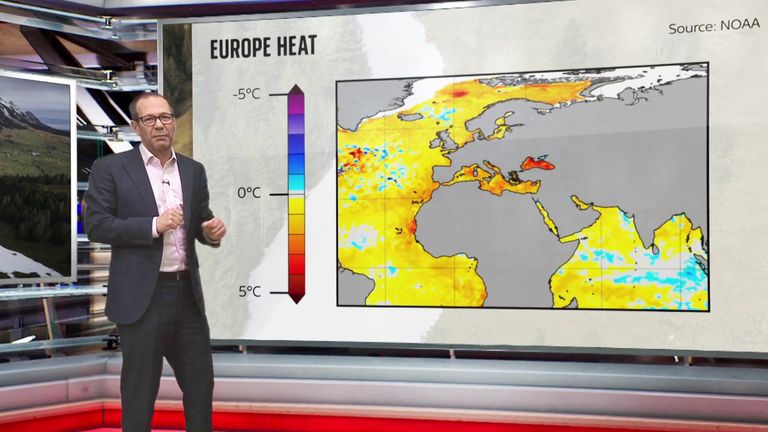Amazing satellite images show brown hillsides in the vicinity of what should have been pristine white snow-covered resorts. This is despite record-breaking January heat across Europe.
Ski slope operators and holidaymakers looking for white winter vacations to Europe’s lower-lying resorts have been disappointed by the lack of snowfall and unusually warm winter temperatures.
Instead, they face patches of grass, dirt, and rock, with resorts being forced to close.
Many countries broke new January temperature records in January. This is due to a wave-like pattern of warm air coming from the jet stream, which was exacerbated by global warming by humans.
Delemont, a weather station located in the Jura Range on the French border, has already set a January temperature record at 18.1C (nearly 64F) for the first day of 2019. This is more than 2.5 degrees Celsius above the previous record.
Professor Liz Bentley, chief executive at the Royal Meteorological Society stated: “There are eight European countries that have broken their January records and a couple have absolutely destroyed them – not by a few [tenths] of degrees.
It has beaten that record by four degrees in Poland. This is a significant amount.
Warsaw, Poland’s capital, experienced 18.9C (66F), on Sunday. This was 4C more than the previous average. Other countries that set new January records include Belarus, Czechia and Denmark, Liechtenstein. Lithuania, Latvia, and the Netherlands.
The unseasonally high temperatures follow a record-breaking summer of heat in Europe, and a record year in the UK.
Continue reading: Seven extreme weather records were broken in 2022
Professor Bentley said that the winter’s extreme heat is quite different from summer.
She said that extreme heat in summer would cause a dramatic increase in mortality rates.
Winters have more to do than the impacts on the ski industry. This means a shortage in snow and water supplies. However, there are also water shortages and extended droughts due to the increased evaporation at high temperatures.
Although slopes higher than 2,000m have been snowed, there are only two runs currently open in Morzine, lower elevation. Ax 3 Domaines was closed on Saturday, just a few weeks after it had been open.
Prof Bentley stated that there is “a lot confidence” in climate change making extreme heat events more frequent and setting more records.
“And they are more extended events that last longer than a few days. They can last for weeks.”
Subscribe to ClimateCast where you get your podcasts
The Daily Climate Show airs Monday through Friday at 3.30pm, while The Climate Show with Tom Heap airs Saturday and Sunday at 3.30pm & 7.30pm.
All about Sky News on Sky News’ website and app on YouTube and Twitter.
This show examines how global warming has impacted our environment and offers solutions.





















